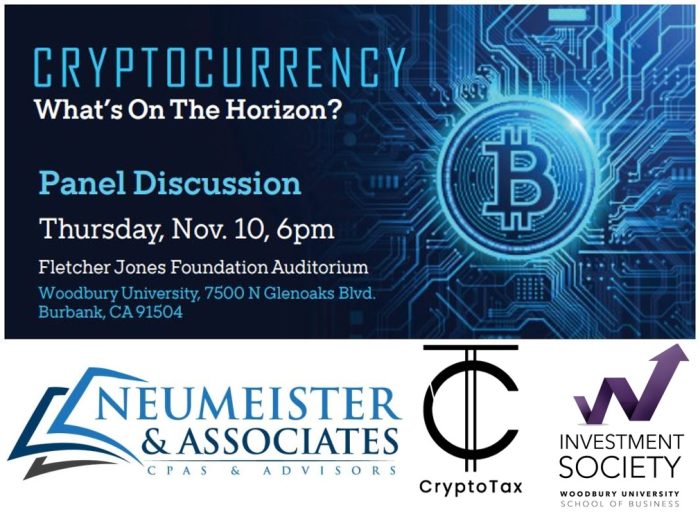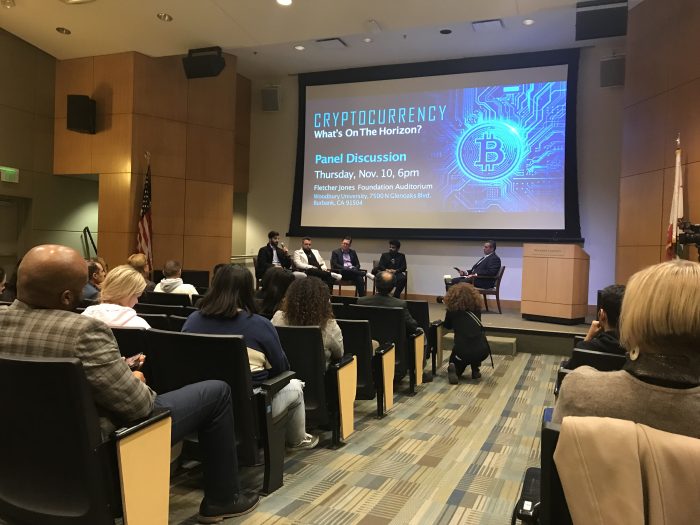Cryptocurrency: What’s on the Horizon
 The cryptocurrency space has become increasingly more mainstream and complicated. What started out with just a handful of digital assets on chain has bourgeoned into thousands of tokens with staking, ining, defi, NFTs, and other mechanisms for crypto-related transactions.
The cryptocurrency space has become increasingly more mainstream and complicated. What started out with just a handful of digital assets on chain has bourgeoned into thousands of tokens with staking, ining, defi, NFTs, and other mechanisms for crypto-related transactions.
To enhance awareness on the cryptocurrency evolution, two of our MBA alumni decided to inform the campus and local community through a cryptocurrency panel dialogue that was well-attended. The event, which happened on November 10, was sponsored by Neumeister & Associates, in collaboration with Cryptotax and the School of Business’ Investment Society.
Jeff Neumeister, founding partner at Neumeister and Associates and co-coordinator of the accounting department, served as moderator in an enlightening conversation, with panel members:
- Abhinav Soomaney, Senior Associate at Neumeister & Associates, LLP., Managing Partner at CryptoTax International Pvt. Ltd., author of Cryptocurrency in a Nutshell: Unlocking the Decentralized (’22), and Woodbury MBA alumnus;
- Eric Dettman, Founder, FXNN Consulting, and Advisor – NFTs at CryptoSlam Inc.;
- Ilya Osovets, Solutions Engineer – Blockchain, Crypto, and NFTs
- Hrair Oganesyan, CPA.
 In the ensuing dialogue, the panelists shared insights on a variety of terms and developments in the cryptocurrency domain. They explained cryptocurrency as a digital currency, whereby transactions are verified and records maintained in a decentralized system using cryptography, rather than by a centralized authority. Cryptocurrency is accommodating quicker money transfer, with the tokens being the representation of the currency. Cryptocurrency is more a ledger than a currency, with blockchain storing the data and recording the nature and time of transactions occurred. These transaction records are unmodifiable. Cryptocurrencies function both as a currency and as a virtual accounting system. Blockchain is a shared, immutable ledger that facilitates the process of recording transactions and tracking assets in a business network.
In the ensuing dialogue, the panelists shared insights on a variety of terms and developments in the cryptocurrency domain. They explained cryptocurrency as a digital currency, whereby transactions are verified and records maintained in a decentralized system using cryptography, rather than by a centralized authority. Cryptocurrency is accommodating quicker money transfer, with the tokens being the representation of the currency. Cryptocurrency is more a ledger than a currency, with blockchain storing the data and recording the nature and time of transactions occurred. These transaction records are unmodifiable. Cryptocurrencies function both as a currency and as a virtual accounting system. Blockchain is a shared, immutable ledger that facilitates the process of recording transactions and tracking assets in a business network.
NFTs, which stands for Non-Fungible Tokens, are digital assets based on blockchain technology. They are generally created using the same type of programming used for cryptocurrencies. They cannot be exchanged or traded equivalently like other cryptographic assets.
NFT can represent a wide range of Internet collectibles such as art, sports memorabilia, music, and games, with an authentic certificate created by blockchain technology that underlies Cryptocurrency.
Crypto mining is the process of creating new currencies by solving algorithms. It consists of computing systems equipped with specialized chips competing to solve mathematical puzzles. The mining process also confirms transactions on the cryptocurrency’s network and makes them trustworthy.
Proof of work vs proof of stake: These are both algorithms to keep the blockchain secure so users can add new cryptocurrency transactions. The key difference between proof of work (POW) and proof of stake (POS) is how the blockchain algorithm qualifies and chooses users for adding transactions to the blockchain. The POW consensus algorithm uses complex problems for miners to solve using high-powered computers. The problems are solved using trial and error. POS uses randomly selected validators to confirm transactions and create new blocks. The POS system was designed to be an alternative to proof of work, addressing energy usage, environmental impact and scalability. The main issue with proof of stake is the extensive investment upfront to buy a network stake. This leads to the insight that POS is riskier. The panelists therefore called for caution with POS, as it can be misleading and may give rise to scams.
The general advice was to always conduct extensive research before getting into Crypto trading. It is wise to find out who is behind a currency and whether it makes sense to you, similar to buying stock of a company.
 It is very easy to create a wallet, because it somewhat feels like being your own bank. Yet, at all times, you should avoid being scammed. Therefore, read the white papers in order to avoid losing money. There are online (software) and offline (hardware) wallets. With a hardware wallet, you can be more assured that your currency won’t unintentionally move. It can be hard to trust your ability to secure an intangible, internet-connected software wallet, but securing a physical offline hardware wallet provides another level of confidence in your method of crypto storage.
It is very easy to create a wallet, because it somewhat feels like being your own bank. Yet, at all times, you should avoid being scammed. Therefore, read the white papers in order to avoid losing money. There are online (software) and offline (hardware) wallets. With a hardware wallet, you can be more assured that your currency won’t unintentionally move. It can be hard to trust your ability to secure an intangible, internet-connected software wallet, but securing a physical offline hardware wallet provides another level of confidence in your method of crypto storage.
A gas fee is a blockchain transaction fee, paid to network validators for their services to the blockchain. Buyers pay gas fees when purchasing a fixed-price item. Sellers pay gas fees when accepting offers.
DeFi (Decentralized finance) is an emerging financial technology that challenges the current centralized banking system. DeFi eliminates the fees that banks and other financial companies charge for using their services and promotes the use of peer-to-peer, or P2P, transactions.
Overall, it is appealing that there is a strong movement to decentralization and deregulation, but we should keep in mind that everything has a positive and a negative side. A deregulated climate is like the Wild West: good and bad things flourish equally, and when harmful activities are commenced, it can be expected that the government will step in.
Whether we are currently enticed by it or not, blockchain technology is here to stay, and will influence our future performance like the internet is doing today. In the 1990s the masses were leery about the Internet, as it had a designated place in our lives. Now it is all around and cannot be erased from our reality. We may expect a similar trend with blockchain technology: it is an infrastructure; a way of communicating. However, it remains wise to make your own decisions and not follow the herd when investing in cryptocurrency.
Last Updated on November 18th, 2022.